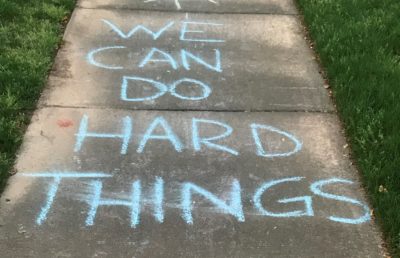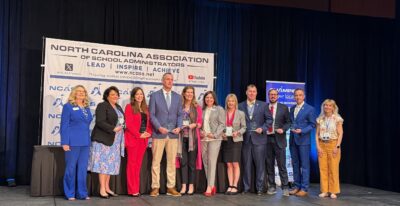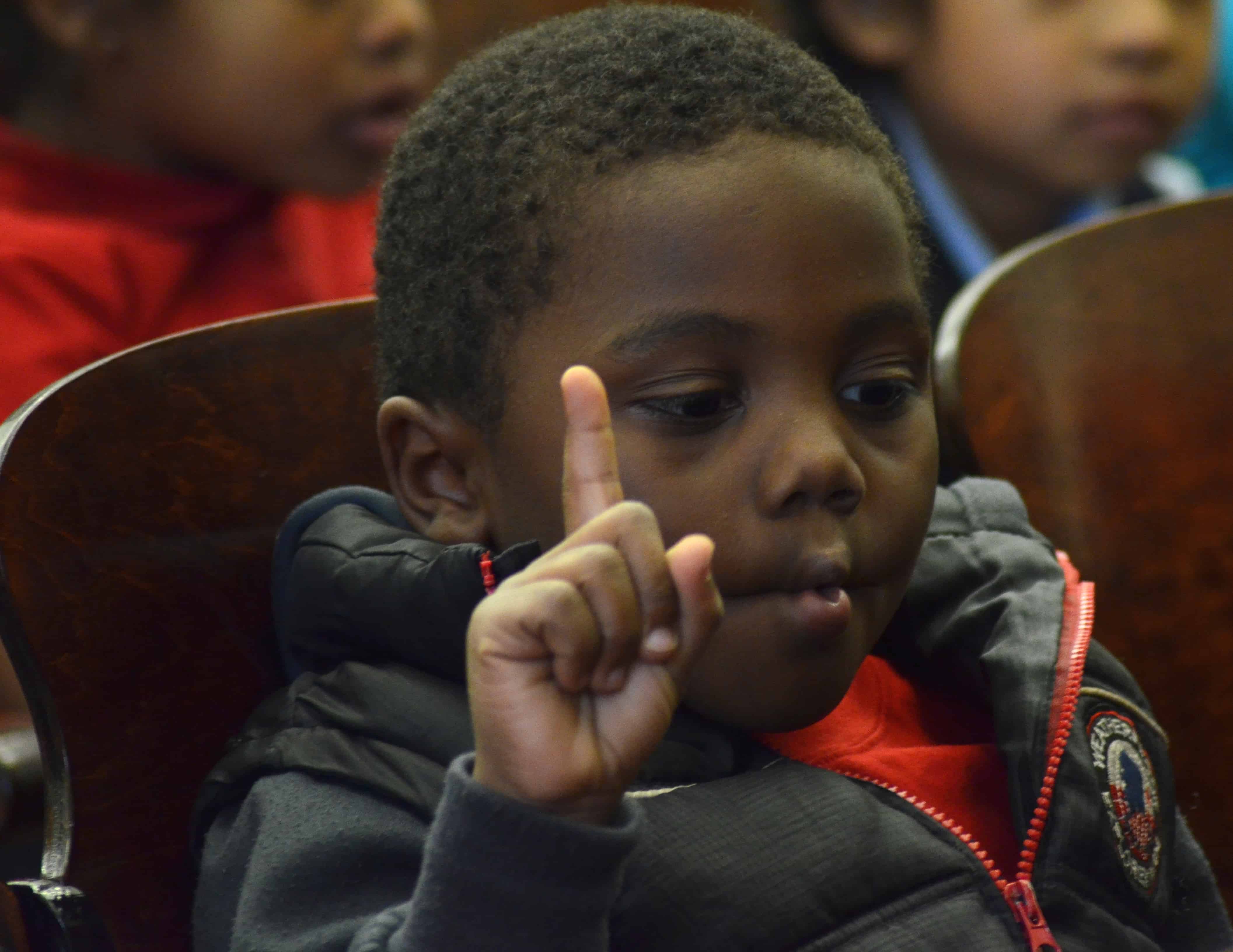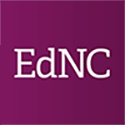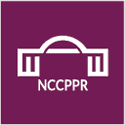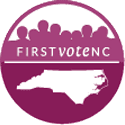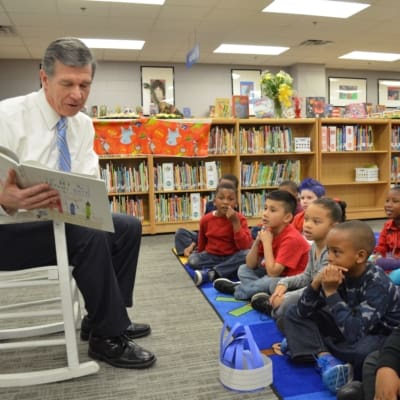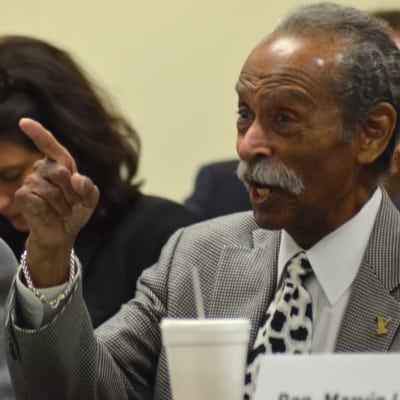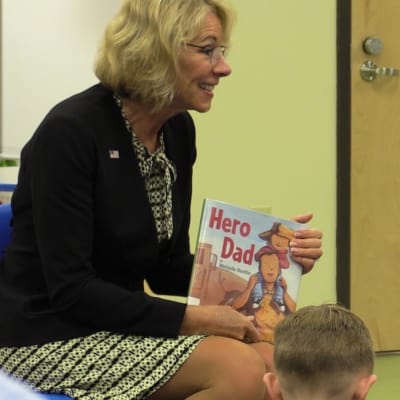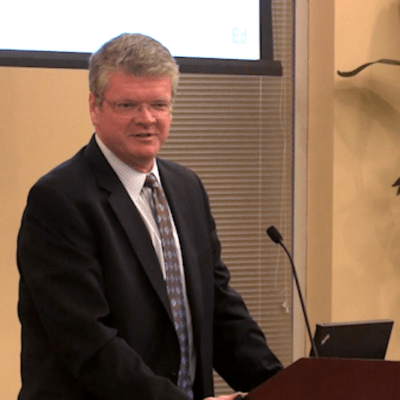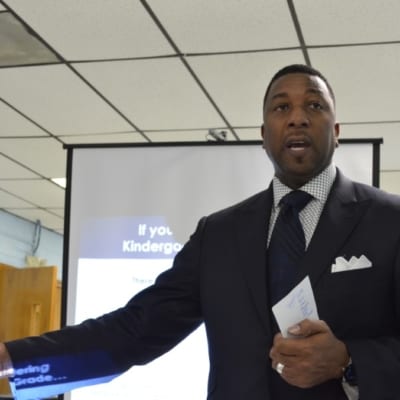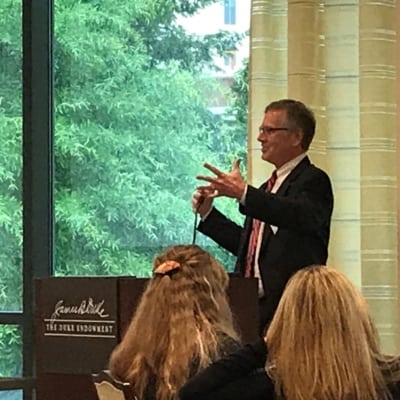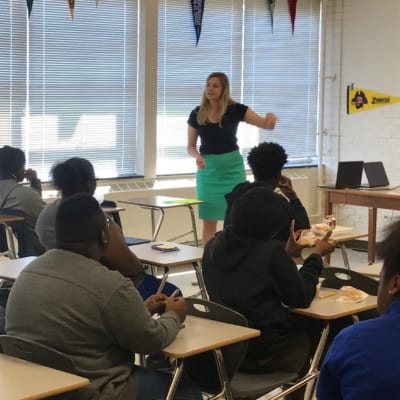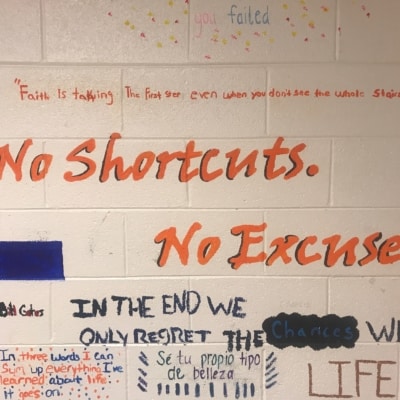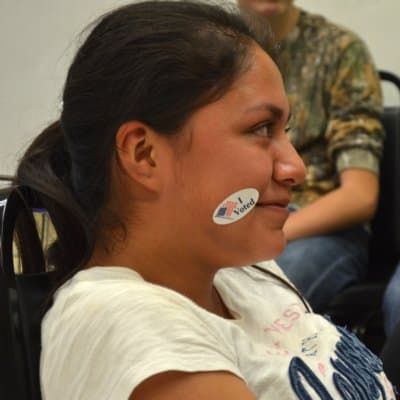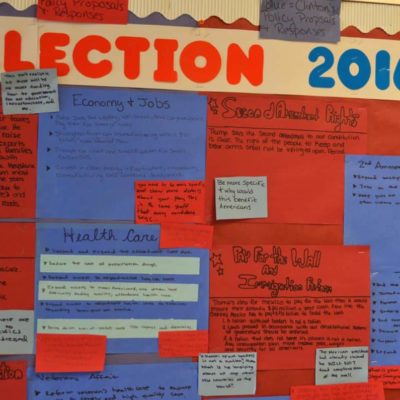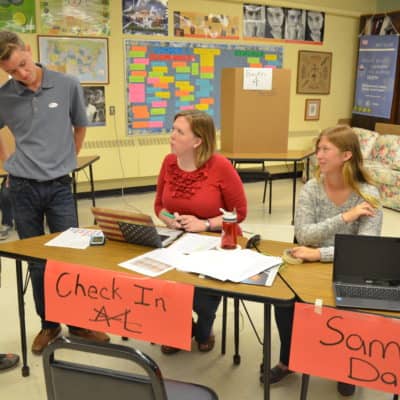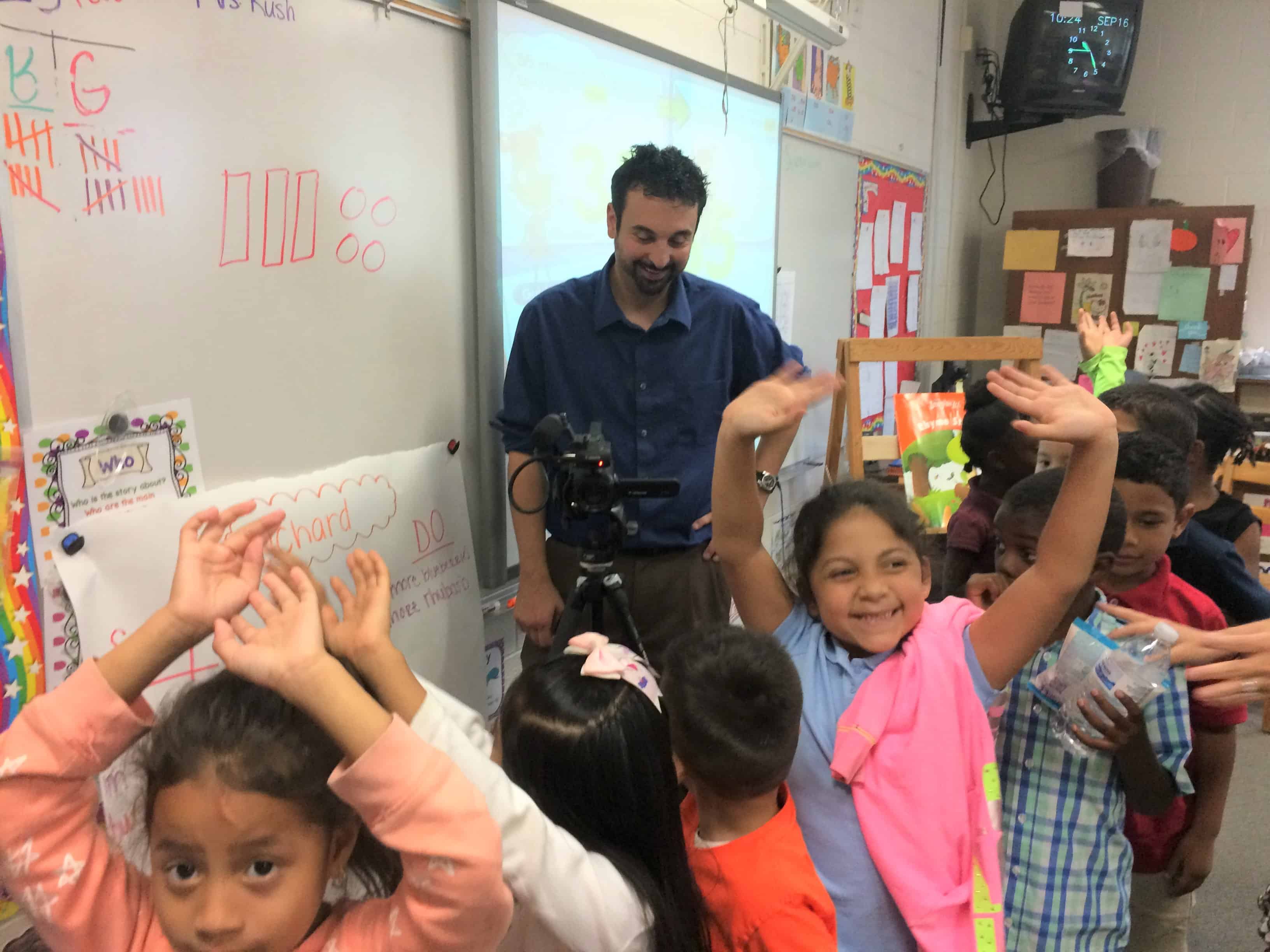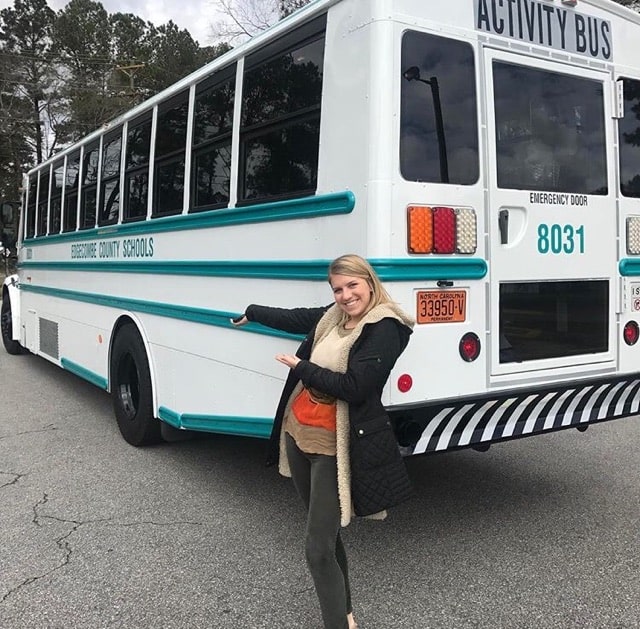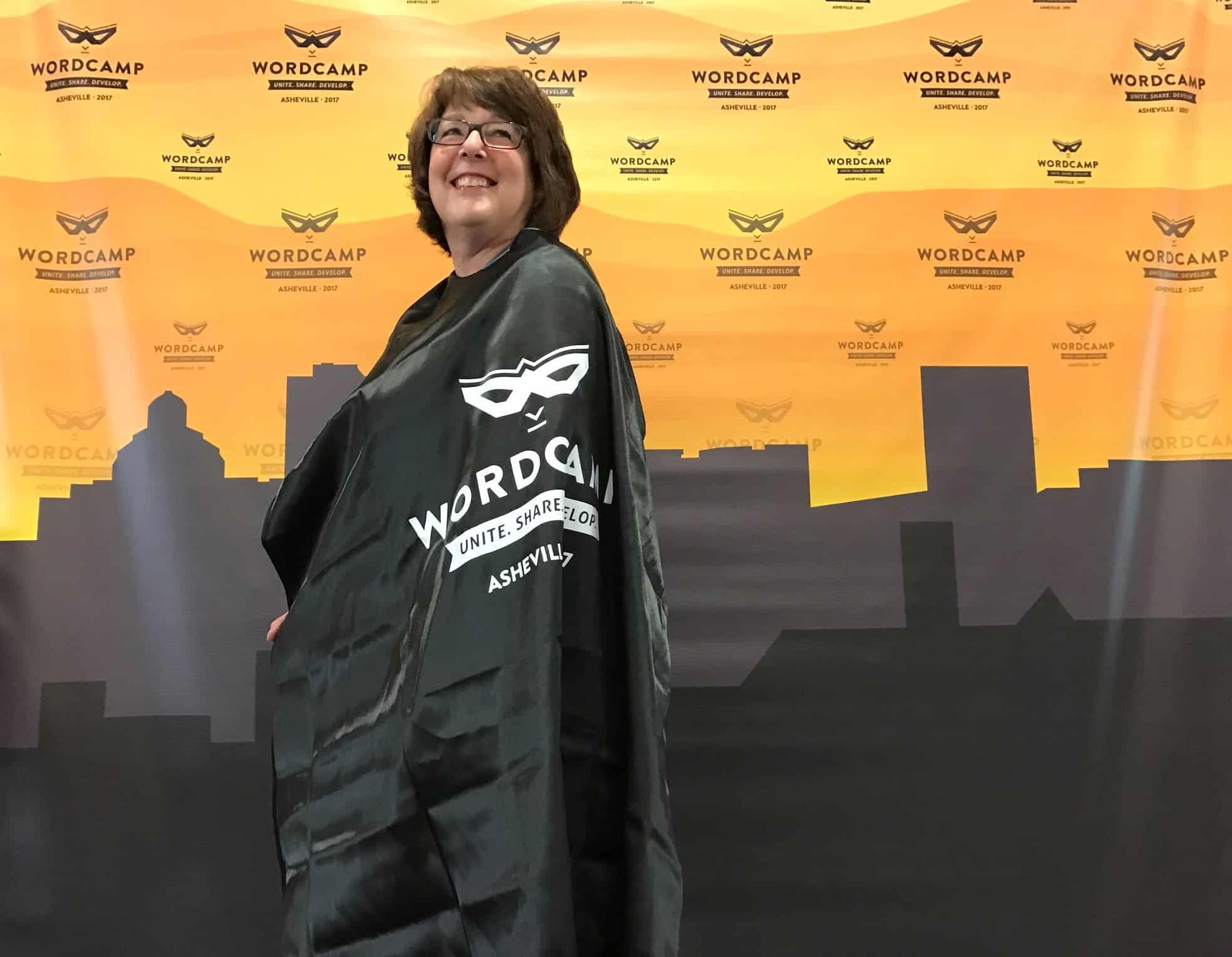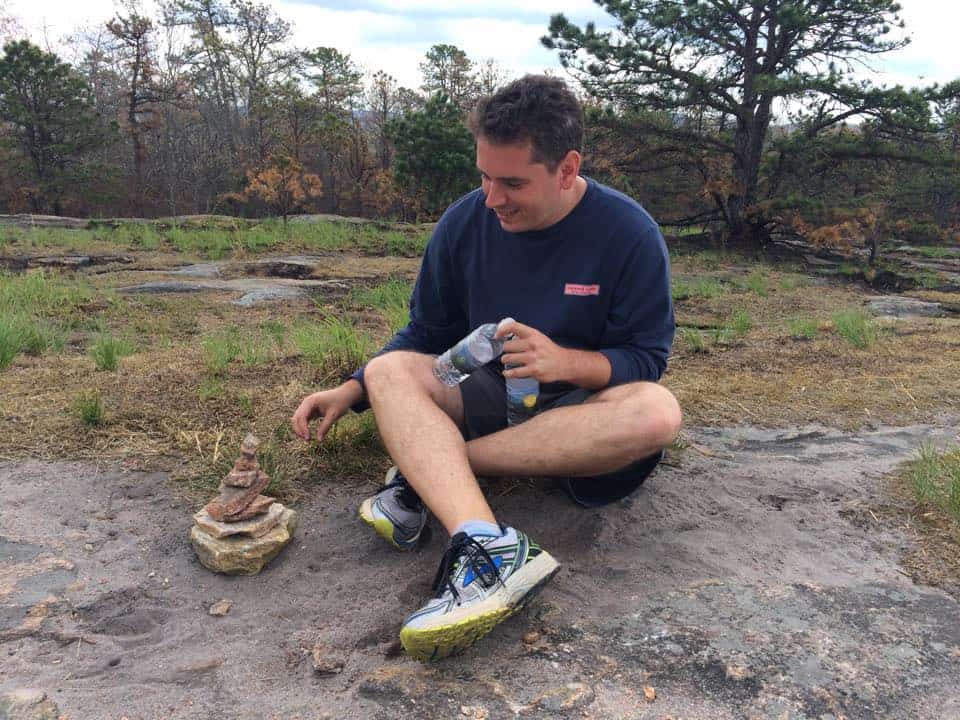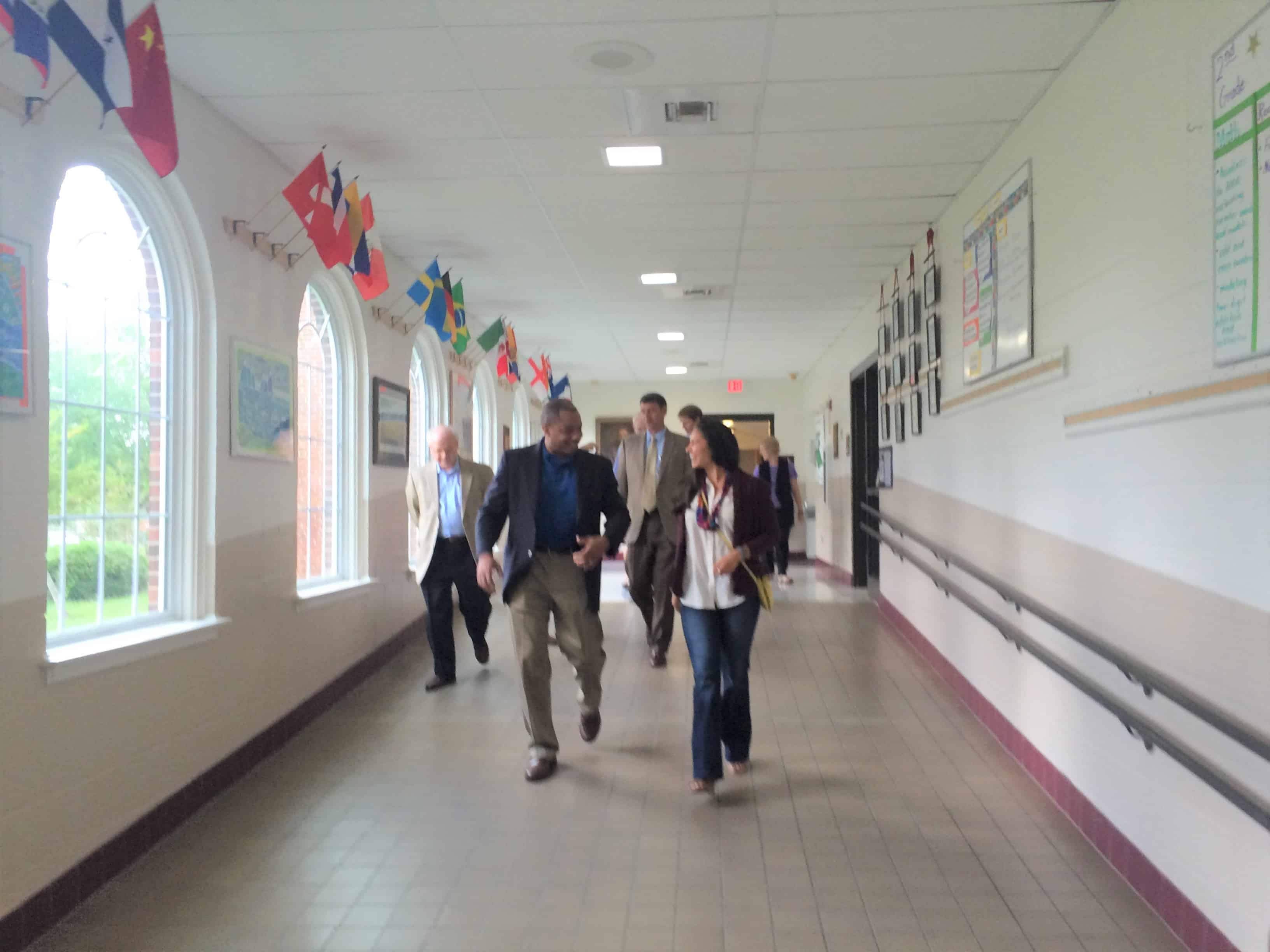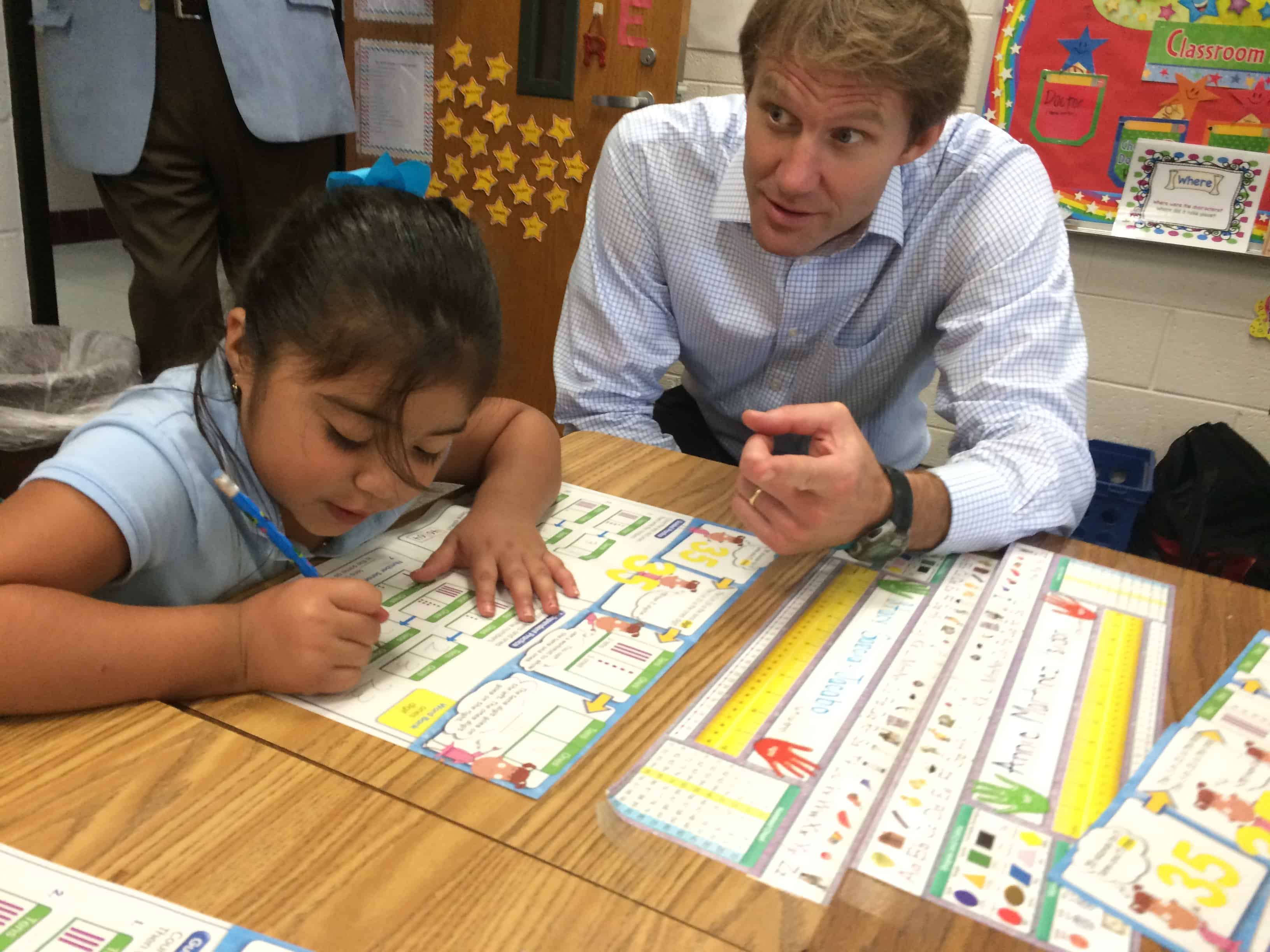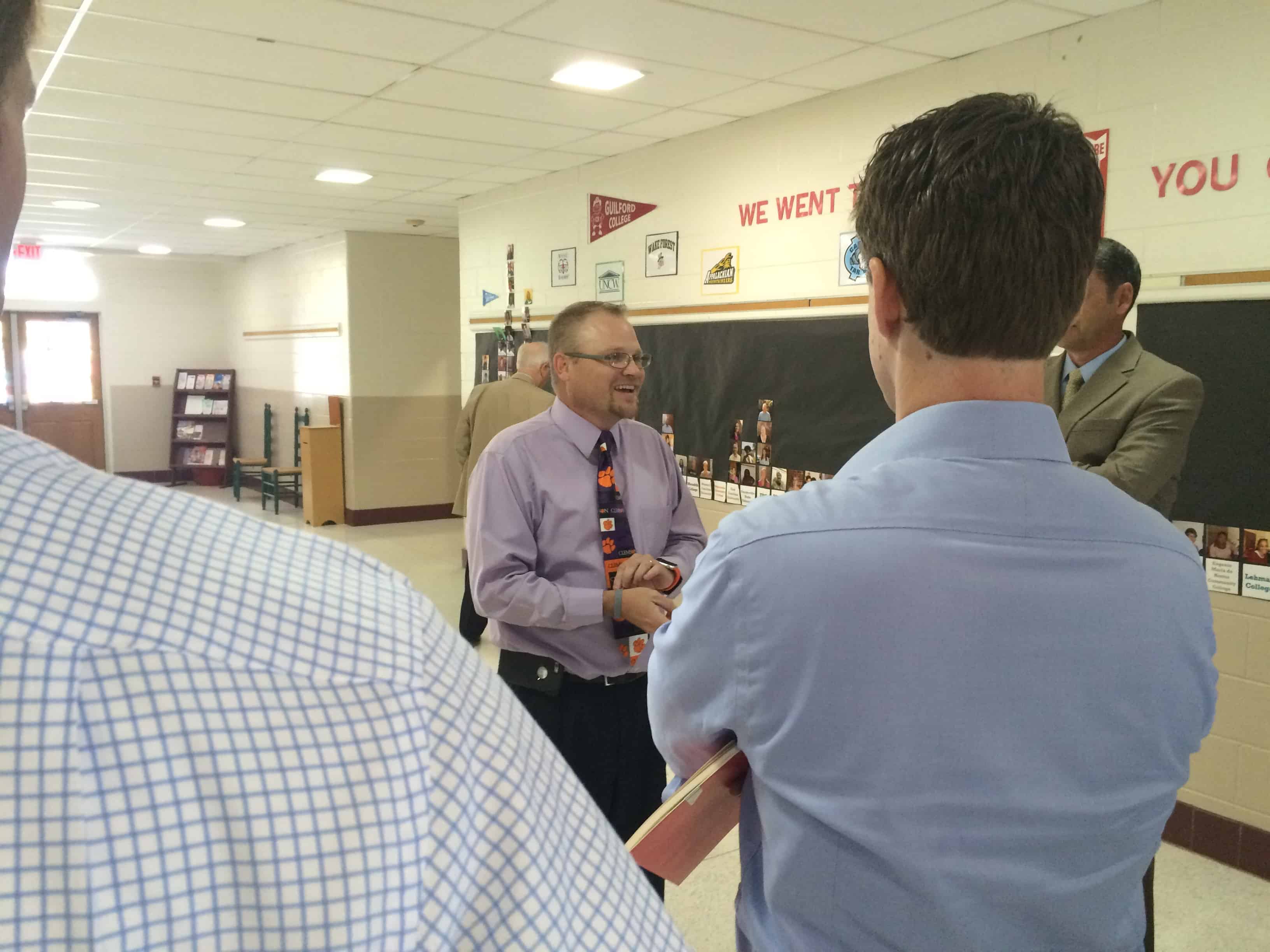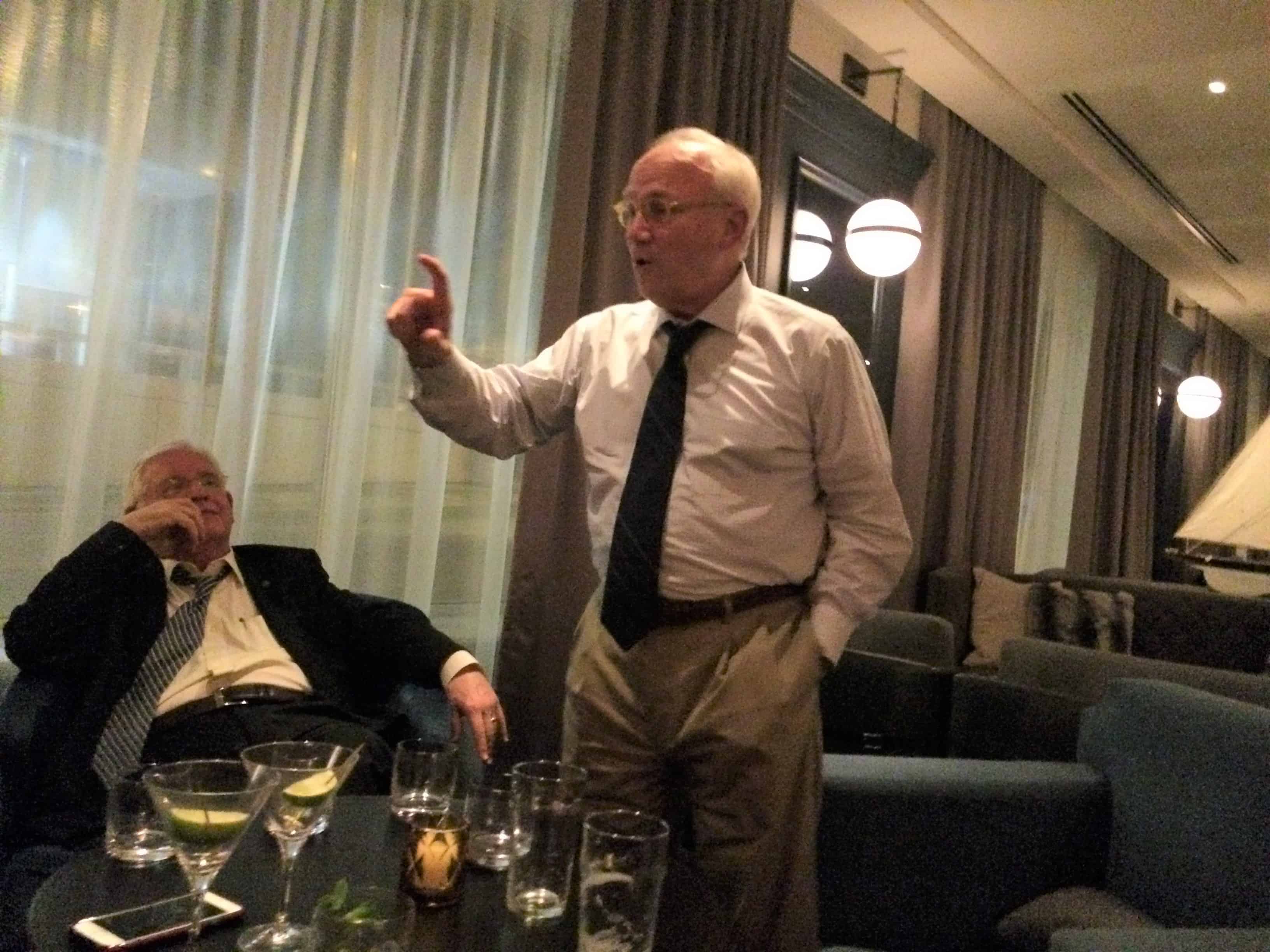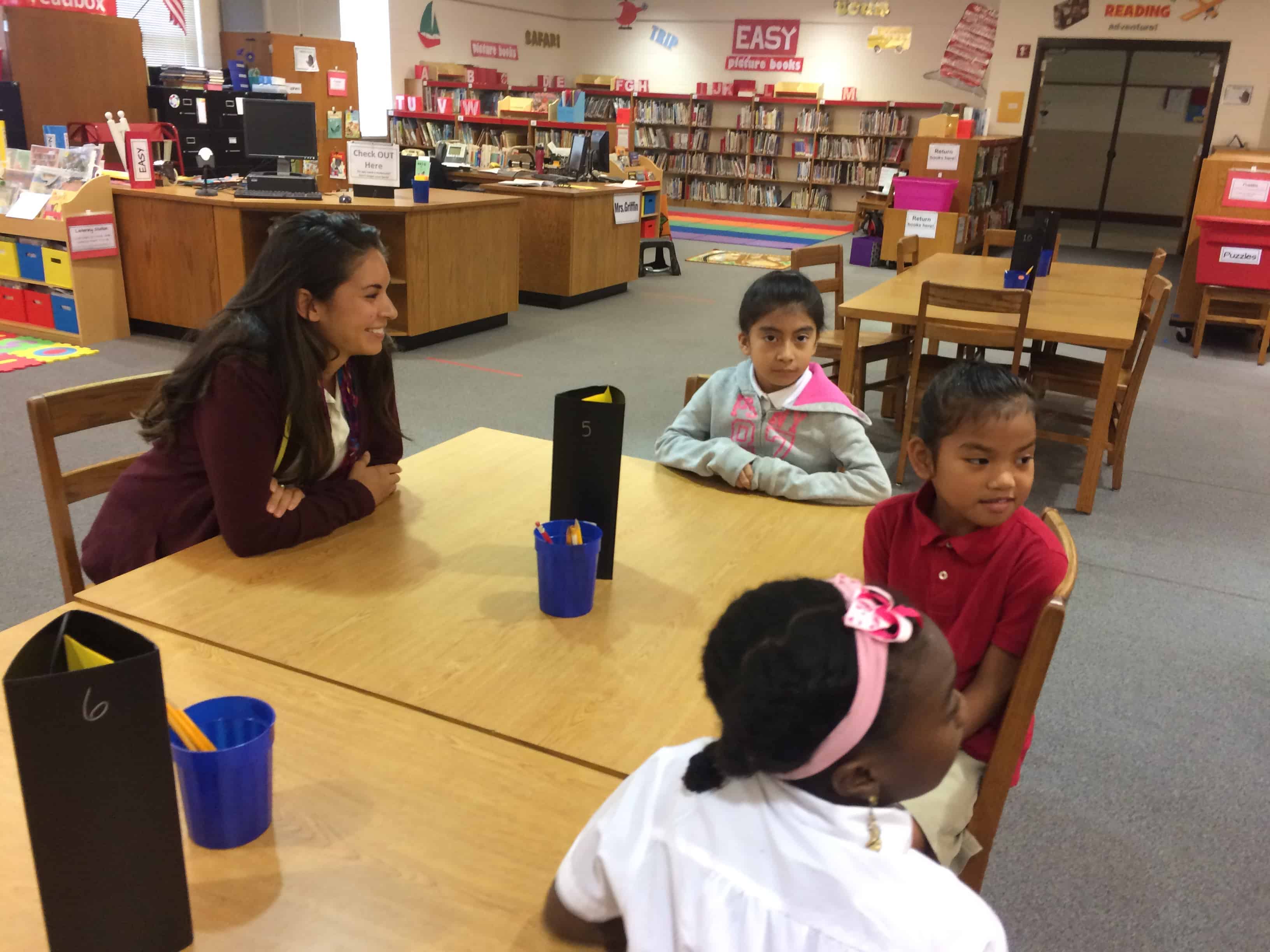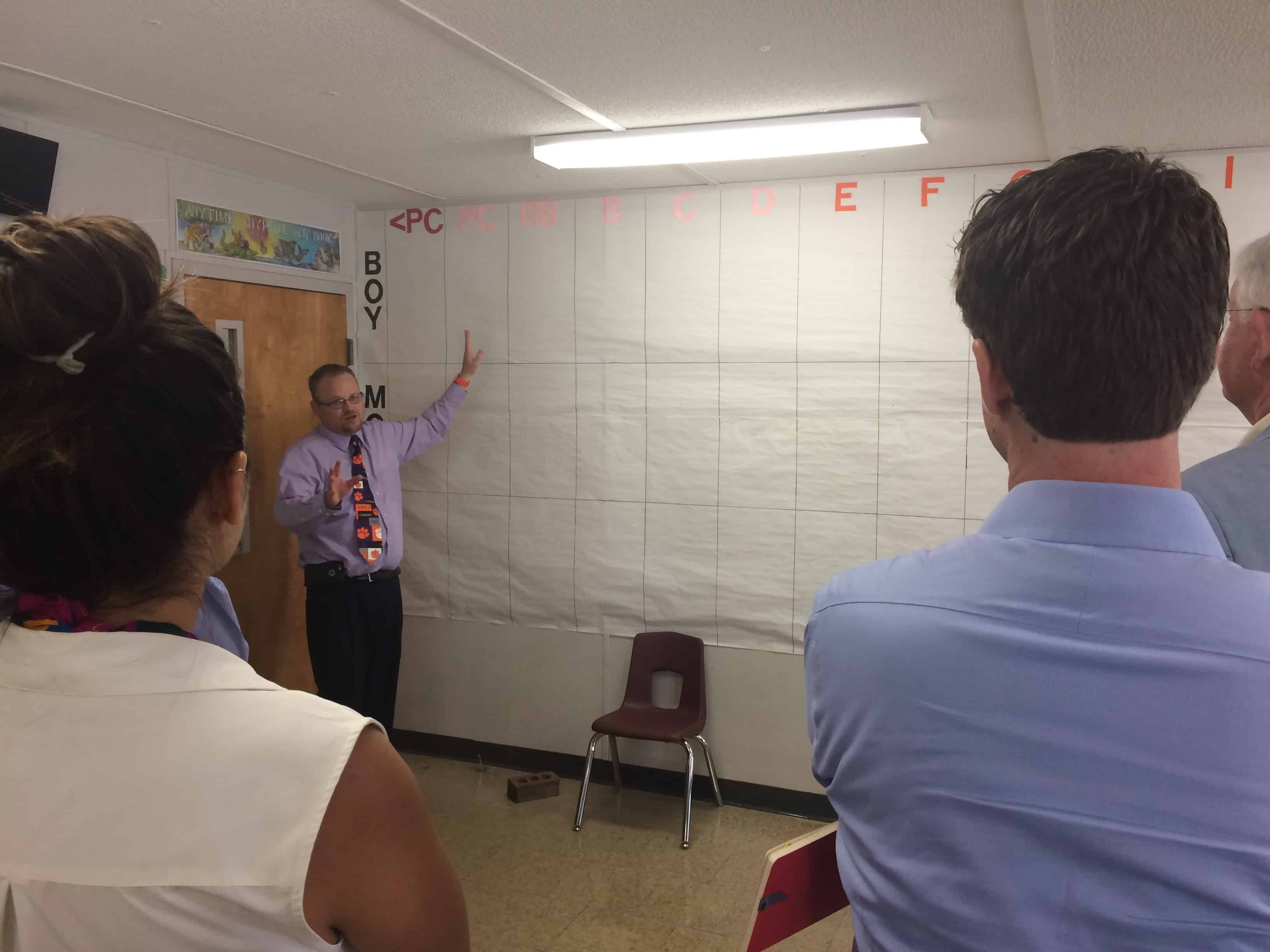
EducationNC launched online two and a half years ago with these core beliefs:
it’s all about our students,
nothing is more important to the future of North Carolina than their education, and
too many stories go untold — stories of teachers, leaders, programs, and schools doing incredible work each and every day, and stories about what is and is not happening across our state to build a 21st century system of education.
This year, too many of our stories were too hard.
Last summer, we met a young girl in Madison County who changed our lives. Just weeks ago, her mother died, another life lost to our opioid epidemic.
Shortly after we held a public policy boot camp in Edgecombe County, Hurricane Matthew hit, flooding homes, schools, and whole communities. Imagine a student at the end of her street looking out over her road to her home underwater. What does that feel like?
The day of the protests in Charlotte, we were planning to hold an event at the Levine Museum of the New South to connect the past, present, and future of the Swann case and its impact on our students and our schools, on our Queen city, and our state. It was cancelled. A state of emergency was declared.
The day we visited a high school in Forsyth County, a student needed the teacher we were visiting to sign a form withdrawing her from school. In the days before, a neighbor had complained to law enforcement about the immigration status of the parents, and the family decided to move to another state.
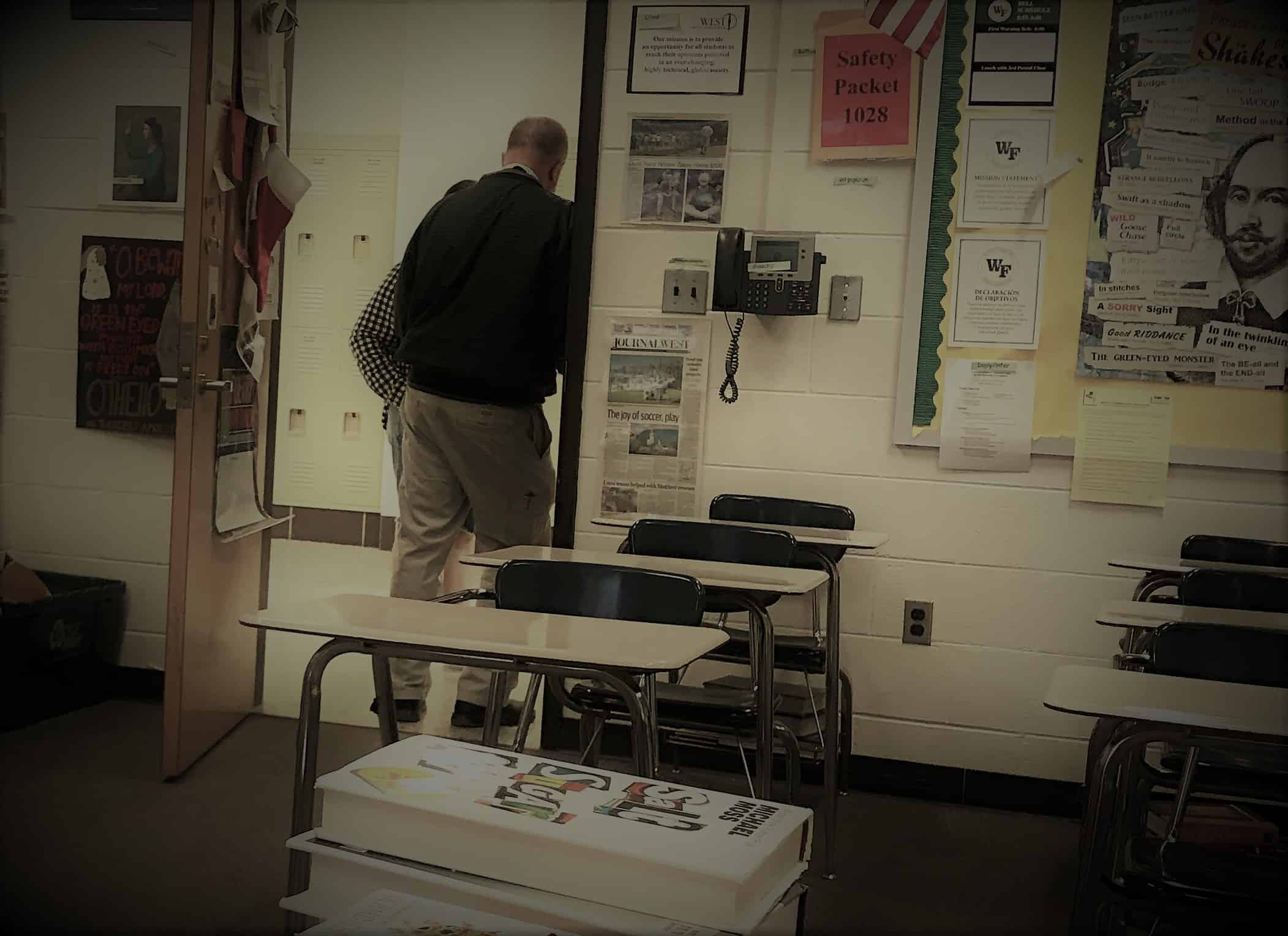
Too often it seemed our state was fracturing along every dividing line you can imagine: race to be sure, but also sexual orientation, rich and poor, old and young, urban and rural, conservative and liberal, Tar Heels and not-from-heres.
When you are looking into the eyes of a child who needs a high-quality education today to have a shot at building a life tomorrow, there is no room for dividing lines, North Carolina.
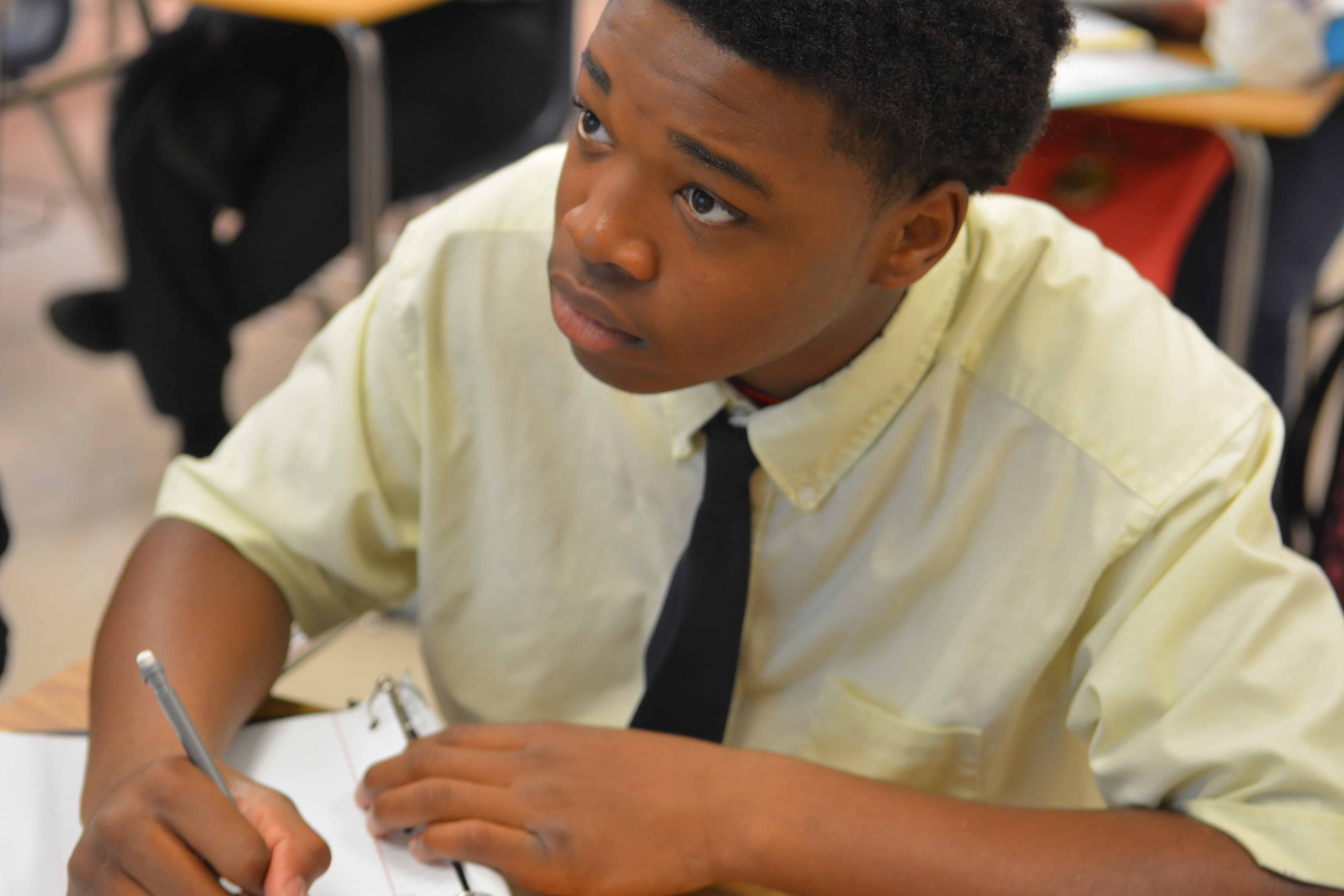

And so our work going forward has to be audacious. Our students deserve nothing less.
June 30, 2017 marks the end of our third fiscal year, and we have been operating online since January 12, 2015.
EducationNC has grown into a collection of nonprofits and initiatives, a catalyst for change for our students, our state, and our future. EdNC is our online, daily, independent newspaper. Reach NC Voices is our 21st century virtual public square, a megaphone for the public, using messaging tools to connect us to people and people to us to discuss public policy in real time so we can better understand communities across our state. The N.C. Center for Public Policy Research is our 40-year-old, nonpartisan think tank studying the most important policy issues facing our state. And First Vote NC allows high school students to participate in simulated elections so that they graduate civic ready — ready to exercise their voice and their vote — in addition to job ready.

Collectively, in an era of transition for news organizations and think tanks, we are a pioneer in the new media landscape, providing news, research, and stories daily; using an innovative market acquisition strategy to establish statewide reach; and creating an architecture of participation to include voices from across the state. Our primary focus is on K‐12, but we can not cover K‐12 without also covering poverty, health care, the economy, the urbanization of the state, and our future.
In our polarized and politicized times, we provide much needed “knowledge journalism.” We distribute content in real time in ways people will actually access it, read it, and share it, and then we create long-form journalism, explainer pieces, and provide in‐depth analysis on the news to guide and shape public policy.

At its annual policy conference in July 2016, the Governmental Research Association honored EducationNC with its award for the most effective citizen education on issues of statewide importance, describing our work as pioneering in disseminating information in the 21st century.
We think the key is getting our information to you where you want to get it. Some of you come to our websites — and we average more than 46,000 pageviews a month. Many of you prefer email — so we send out almost 100,000 emails each week. We continue to work with Impact Thread to learn more about our audience and your preferences — more than 56 percent of you come to us via social channels. This year we adjusted our strategy on Facebook to maximize our reach, and we are now in the process of better understanding how to leverage Twitter.
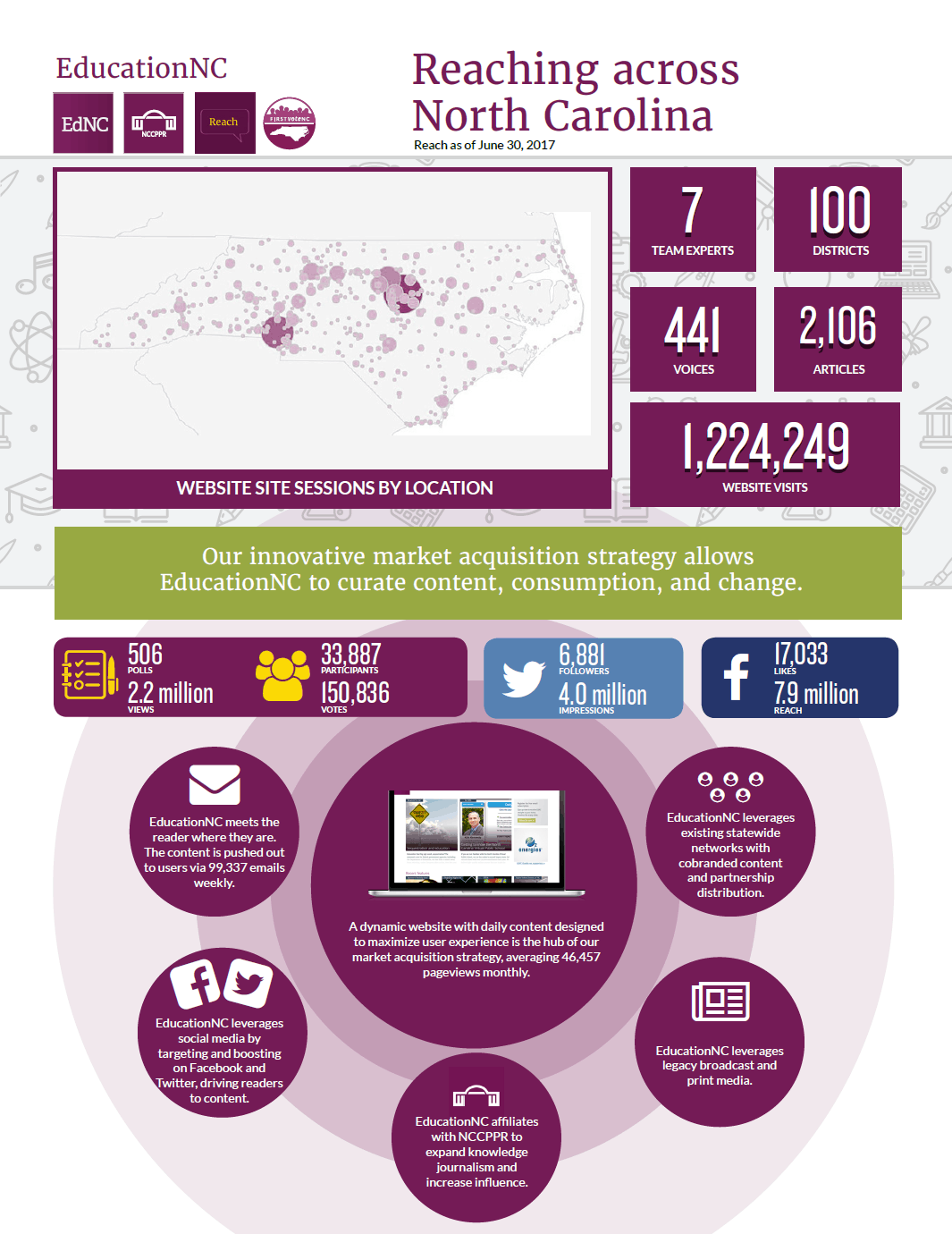
We believe that the best measure of our work is when you do not just consume the information, but when you do something with it. Email it to a friend. Post it on your Facebook page. Start your own discussion. Tweet your reaction. Attend a meeting. Contact a policymaker. Write an article for us. Engage.
“Congratulations to you and the team for the many outstanding accomplishments. It is amazing how much has been accomplished by such a small but obviously effective team. As we know, leadership matters and without your energetic, visionary leadership none of this would have been possible.” — Brad Wilson, CEO of Blue Cross and Blue Shield of North Carolina and member of EducationNC’s Board of Directors
EdNC
Day in and day out, our reporters cover the policymakers elected to build a better education system for our children, those with policy and political influence, and our students, schools, and communities in need.
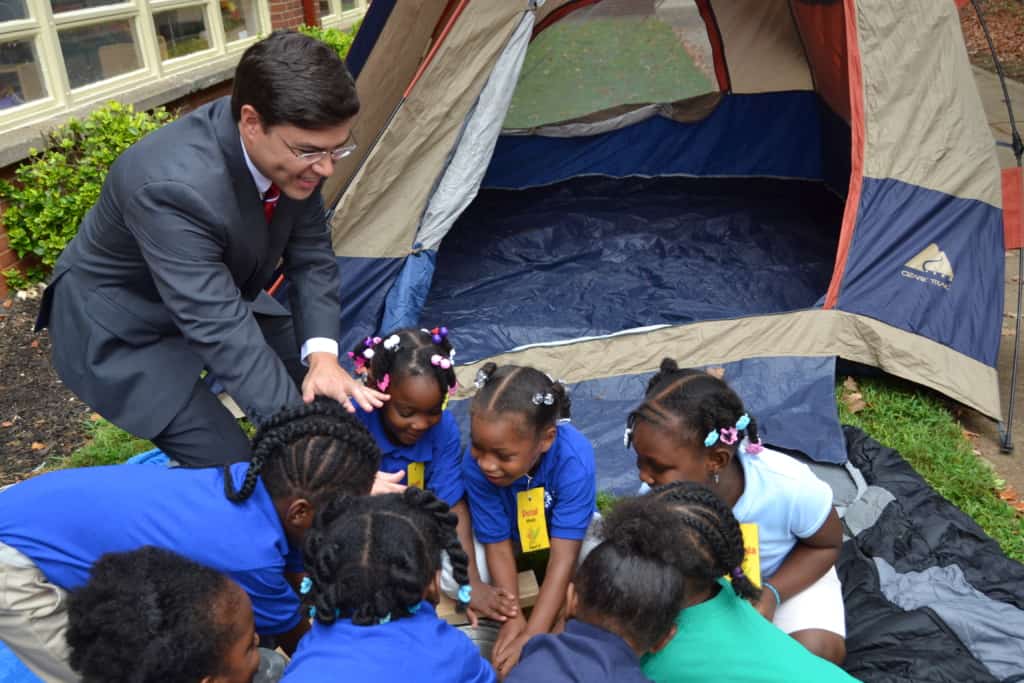
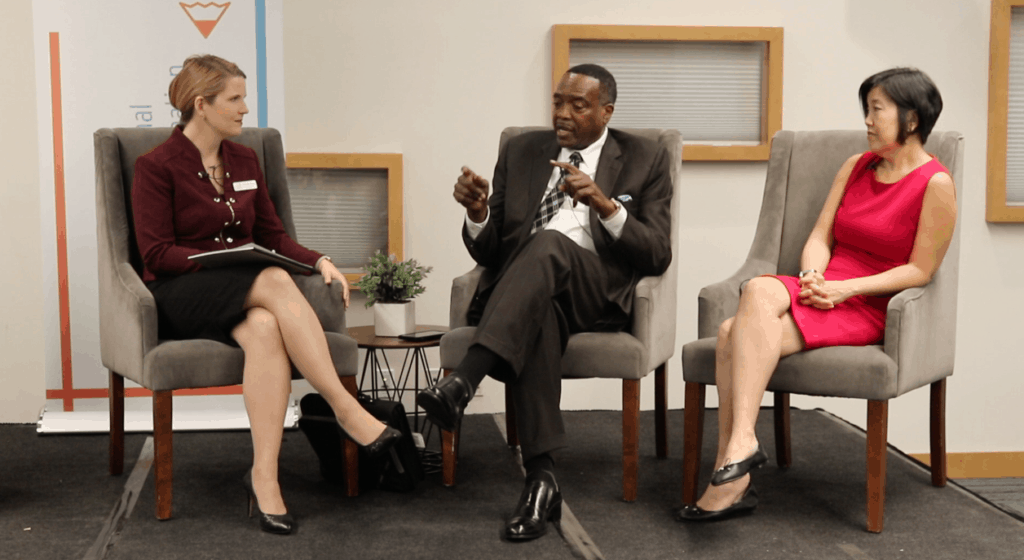
Before EducationNC even launched, a principal asked us, “Can this pay schedule be right?”
Everyone else seemed focus on teachers, but North Carolina is 50th in the nation in principal pay. There are no instances, none, of schools turning around without a great principal. It took ongoing reporting for more than two years, but in this year’s budget, principals receive an average 8.6 percent salary increase and assistant principals a 13.4 percent average salary increase over the biennium. The salary schedule for principals is based on the average daily membership of the school with principals able to make more depending on the school’s academic growth.
Long after the waters receded in Edgecombe County, the impact of Hurricane Matthew persists for students, schools, and businesses. During the special session, our reporters asked repeatedly whether $200 million was enough, and policymakers went on the record that it was not and more would be appropriated in the long session.
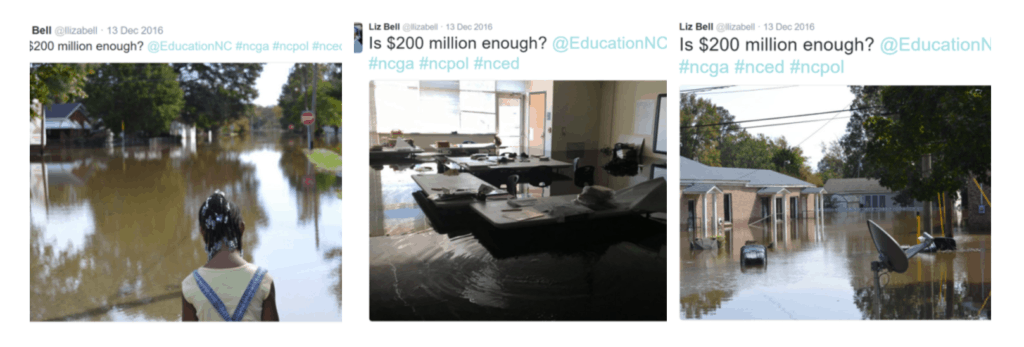
We will continue to follow the aftermath of Hurricane Matthew on this community.
This EdExplainer on class sizes was assigned to the N.C. State Board of Education as “homework.” We are researching what class sizes are appropriate for K-3 students in one-to-one, blending learning environments.
In June 2017, legislators said they intended to fund enhancement teachers in 2018-19. When the budget was released, the provision was not included. Alex Granados, our senior reporter, asked leadership about the provision and why it was not in the budget as promised. President Pro Tem Senator Phil Berger said, “We’ll have to get back to you on that.” Shelly Carver, a spokesperson for Berger, followed up with us, indicating the oversight was not intentional. “I believe it was inadvertent and will be included in a technical corrections bill,” she said.
And EdNC was the first news organization in North Carolina to use 360 reporting.
Across party lines, our news is respected for its independence.
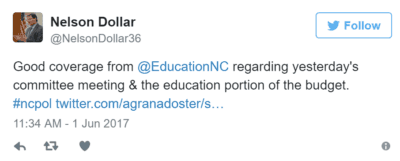
“EducationNC is a one stop shop for me to follow education policy at the national, state, and local level. It’s so valuable to have both a depth and breadth of coverage and perspective.” — Graig Meyer (D-Orange)
“EdNC has proven to be a reliable and timely reporter of education news in North Carolina. I have found its reporters both knowledgeable and informed regarding the often confusing world of education policy.” — Buddy Collins, Vice Chair, N.C. State Board of Education
Within communities, our ability to get the story right is valued.
“In this age of fast-paced media, we need an organization who takes time and does thorough, investigative work to highlight issues that are of concern to its citizens. This is a valuable service to the community. The story EdNC did on Imprints Cares, its programs and its families, is the best, most in depth reporting we have experienced. They took time, with great sensitivity to the families, supporting them to voice their story.” — Nikki Byers, Executive Director, Imprints Cares
Reach NC Voices
Imagine a classroom. The teacher poses a question to the class. A smattering of hands go up. The teacher calls on one of the students. The student answers the question. Now imagine instead that the teacher asks the students to pull out their devices. She poses the question to all of the students via text. All of the students respond to her question. The teacher has more information to work with. All of her students are engaged.
Welcome to Reach NC Voices — the most robust engagement tool we know of. We can engage people in a classroom, in school, in a company, in a community. We can engage people that have never raised their hand. In six months, we have redefined the world’s concept of the public square. Think of Reach NC Voices as a megaphone for the public.
James Carey, a journalist and communications theorist, said, “The press does not ‘inform’ the public. It is ‘the public’ that ought to inform the press. The true subject matter of journalism is the conversation the public is having with itself.” In the aftermath of the last election, it is important for the public to be heard, but it is more important for us to hear the public.
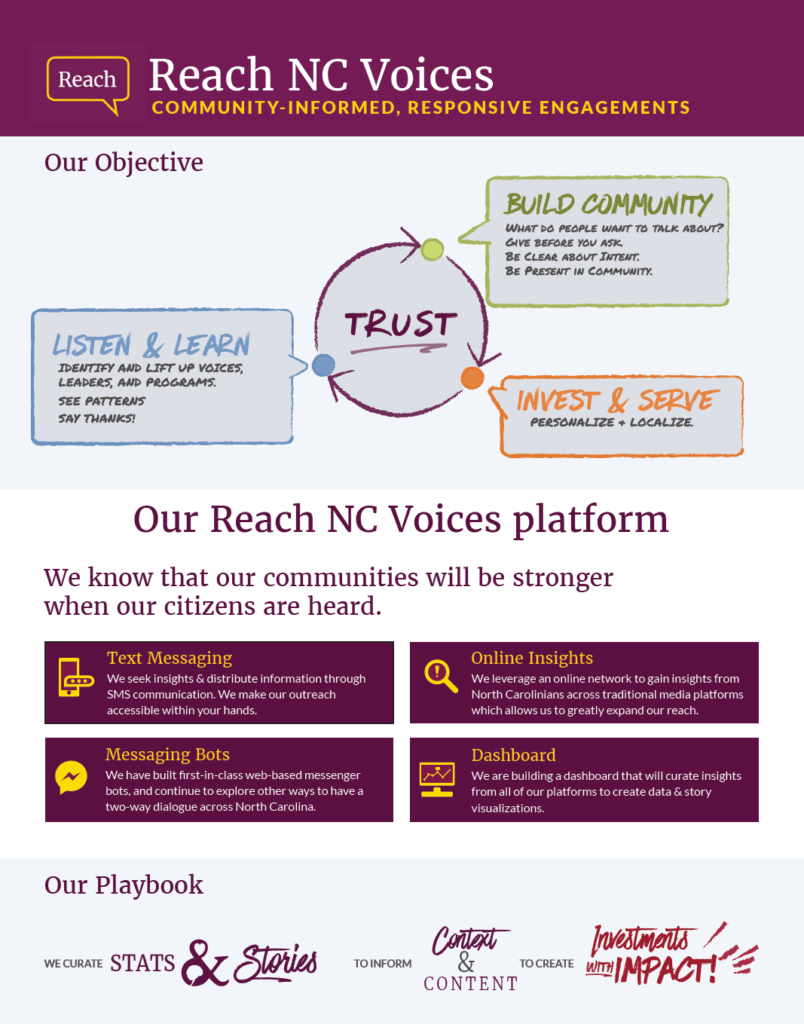
In six months, we have interacted with residents in all 100 counties across North Carolina through this initiative — the last county we touched was Hyde County with a poll answered by a Hispanic female.
2.2 million residents across North Carolina reached
33,887 residents engaged
150,836 responses, stories, and comments
We are exceeding all of the metrics we established thanks to our remarkable team, including Nation Hahn, Cat Oaker, CityZen, GroundSource, Impact Thread, Food Insight Group, and Annika Conrad.
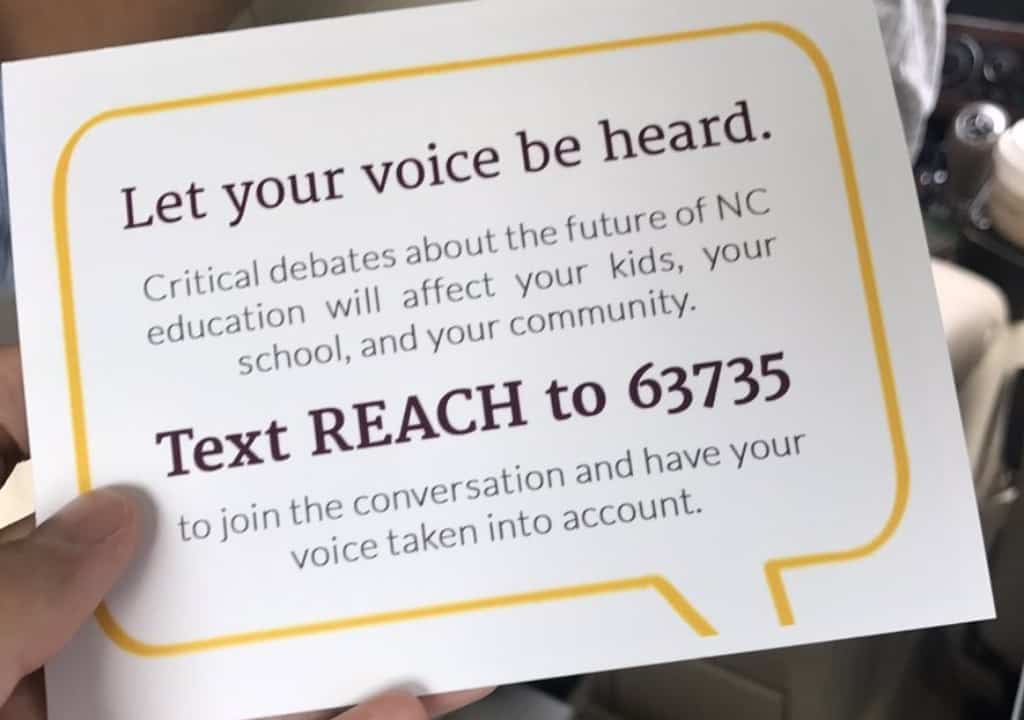
This project would not have happened without the leadership of Brad Wilson and Kathy Higgins, and a $400,000 lead investment by Blue Cross and Blue Shield of North Carolina, an invaluable thought leader in the design of the initiative.
Before developing the Reach NC Voices toolkit, our team researched best practices in capturing the attention of influencers and decisionmakers. We learned they are more likely to act on:
a repeatable story,
statewide data showing the story isn’t an isolated occurrence, and
localized data showing what a community thinks and feels about the issue.
Our 21st century public square allows people to weigh in on vital debates, but also share their hopes and dreams.
Recently, we worked with Edgecombe County Schools to help the principal include student voice in school improvement discussions. His high school provided a text short code to their students and asked them to weigh in on how to improve the school. The responses made it clear that the students want increased agency in decisions affecting their education.
The question the principal found most valuable was “Where do you see unfairness in school?” Not only did the answers identify physical locations where students saw unfairness, but they identified policies enacted by teachers creating unfairness, such as assigning online work and not providing accommodations for students who do not have internet access at home. The principal will use their suggestions to create the summer improvement plan, and craft professional development and new school policies to create a fairer learning environment.
We heard from a military mom in Onslow County who feels as if the school system ignores the reality that she feels as if she is a single mom due to her husband’s deployment. She wants to be able to participate in supports for single parent families.
We heard from a mother who shared, “My kids are all currently in college and they are great kids so my dreams for them are on track. What helped them to get to this point? Good teachers who took the time to meet each ones individual needs.” She went on to make the case for teaching assistants.
A student down east when asked about his summer plans replied, “I wanna help my mom with anything she needs so I’m going to get a job.”
These comments in isolation are powerful, but it is the aggregation of these voices over time that will help us create more understanding of public opinion. We believe that listening matters. Reach NC Voices allows us to listen to people across North Carolina, and lift up their voices into our news and traditional news outlets, to inform everything from philanthropy to public policy.
The N.C. Center for Public Policy Research
EducationNC and the N.C. Center for Public Policy Research are related 501(c)(3) organizations. We share management and common board members and are brother/sister organizations for the purposes of the IRS Form 990.
“This era of digital communication technology has brought about significant shifts in the dissemination of journalism and policy analysis,” says Ferrel Guillory, the vice chair of EducationNC and the N.C. Center for Public Policy Research. “Our work will build a stronger base for enriching North Carolina’s public dialogue and decision making, with our school children — the future of our state — at the center of our work.”
In the early days of EducationNC, we met with Amy Mitchell, the director of journalism research for the Pew Charitable Trusts. Mitchell told us that for an organization like EducationNC to thrive it would have to combine the best new media practices — including a robust platform with high-quality multimedia content — with the depth of think-tank research.
For 40 years, the N.C. Center for Public Policy Research has provided nonpartisan research, evaluation, and analysis on the most important public policy issues facing our state, serving as a think tank, watchdog, and futurist. The Center’s in-depth, respected research — powered with EducationNC’s statewide reach — is needed now more than ever, providing North Carolina with a deeper understanding of the opportunities and challenges facing our great state.
Our thanks to Andrew Holton, a long-time contributor to the Center, for launching our Friday at Five policy roundup and our weekly insights that unpack data, help us understand what is working and what is not working, and think about the future and the role of the state.
We think North Carolina needs to move away from one-size-fits-all solutions and move towards political, policy, and philanthropic strategies that take into account the very different needs of urban areas, suburban areas, rural counties with a metro hub, clusters of similarly-situated rural counties, and rural counties with no urban cluster. This article was a starting point for a conversation we want to have about rural North Carolina. We gathered some data, looked at some maps, and thought about what we saw. We shared it with colleagues across the state, added more data points, and included many of their observations. What trends do you see in the maps? What other things should we be considering?
The Center continued its important work on mental health issues facing North Carolina, with an in-depth look at youth suicide. Too many of our students attempt suicide, and our schools are on the front lines of this issues. Last December, the Intentional Death Prevention Committee, a committee of the Child Fatality Task Force, approved four suicide prevention recommendations that, if made into law, would make major changes to how schools approach suicide.
Literacy matters. Our in-depth look at Read Charlotte and its 100 Day Challenge is just part of our work to lift up the work of the Institute for Emerging Issue’s kidoNomiCs and the collaborative work the N.C. Early Childhood Foundation in collaboration with NC Child, the North Carolina Partnership for Children, Inc., and BEST NC on NC Pathways to Grade-Level Reading.
“It’s rare these days to have extensive coverage, and such quality. Thanks for all of your work to lift up high quality education in North Carolina.” — Munro Richardson, Executive Director, Read Charlotte
Upcoming research includes the teacher pipeline and professional development opportunities for teachers.
Our thanks to Nancy Rose and Barb Baranski for their tireless work on the Center’s new website.
First Vote NC
Kids Voting NC was established more than 20 years ago and funded through grants, private donations, and appropriations from the N.C. General Assembly. The program was active in 25 counties. The affiliates were different in structure, but their mission was the same: to engage young people in the democratic process by conducting simulation elections.
After many years, a determination was made by the board of directors that Kids Voting NC needed to reimagine its efforts and develop a plan for impact and sustainability. With that in mind, the program was transformed to First Vote NC, with Hunter Buxton serving as the executive director. The mission of the redesigned organization was to work with public high schools (traditional and charter) to introduce students to the practical components of voter participation, deliver a realistic voter simulation to allow them to practice these fundamentals, and provide online tools for teachers to engage and motivate students to become civically engaged. First Vote partnered with EducationNC, Carolina K-12, and the N.C. Department of Public Instruction to implement this initiative.
Our online 2016 election was a success right down to the sticker, with more than 32,000 students participating in 46 counties, and teachers submitting extremely favorable evaluations of the program.
First Vote has a proven model, an excellent curriculum, a website, an online voter platform that supports data analysis, and a cadre of educators who have implemented the program at their schools and would recommend the program to their peers. We think it will be a national model. The Board of First Vote NC voted on December 5, 2016 to cease its nonprofit operations and invite EducationNC to manage the program going forward. Our board of directors agreed to do so in June 2017. Buxton will continue to manage the program for EducationNC.
The mission of EducationNC includes informed citizen participation, and our ongoing work with First Vote NC will help us connect students to our architecture of participation, including more and more voices in our conversation about our students, our state, and our future.

With our collection of nonprofits and initiatives — EdNC, Reach NC Voices, the N.C. Center for Public Policy Research, and First Vote NC — we are interested in prompting bigger systems change, imagining our economy and the education system needed to support it in five years, and 10 years, and 25 years, and beyond. We are thinking about how to create a slingshot effect statewide, tapping into naturally occurring momentum around our state to speed up the pace of change.
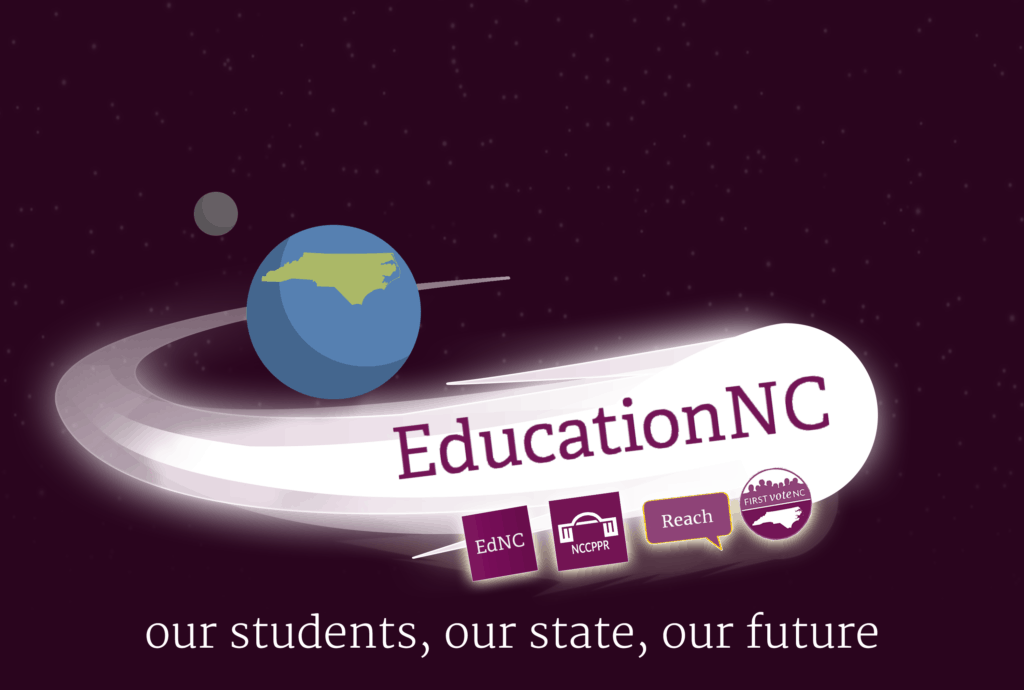
We will visit schools, churches, small town newspapers, and all of the places in communities where people gather. We will talk with teachers, farmers, and truck drivers. We are using #loveNC on Twitter and Instagram for our photos. To build public will for education, we must build public will for our state.
“Thank you for helping fuel an extraordinarily important conversation. We are eager to contribute our piece to the statewide slingshot effect that North Carolina and its kids will so benefit from!” — Ginger Young, Book Harvest
We are going to learn and gather insights, reporting them along the way. We will continue our focus on leadership and governance of our schools, the whole child, and 21st century learning environments, but we will also conduct research about the adolescent experience of equity, faith, and literacy, among other important issues. We will serve our state by publishing what we find, engaging readers, and lifting up the voices of others. We will seek collective trust, building anew a sense of statewide community.
Thanks to the Burroughs Wellcome Fund, we will continue our travels abroad to identify best practices. India is our next destination from July 28-August 6, 2017. Follow us using #BWFGlobal.
We will take more people to see what we see in all of the nooks and crannies of North Carolina. We want people to better understand our state from rural communities in eastern North Carolina to homeless camps scattered statewide to our urban city centers to the hollers of Appalachia.
Our second annual Carolina Food Summit will be part of the National Humanities Center’s gathering on North Carolina: The New American Heartland on September 27-29, 2017.
We will invest in leaders. This spring, a young philanthropist wondered out loud with us about convening a group of emerging thought leaders across all of our dividing lines to break bread, get to know each other, and just see what happens. As these leaders move into positions of power over the course of their careers, they will have pre-existing relationships. Of the 21 people who came to the first convening, 10 were persons of color. We have nicknamed it “the collective.”
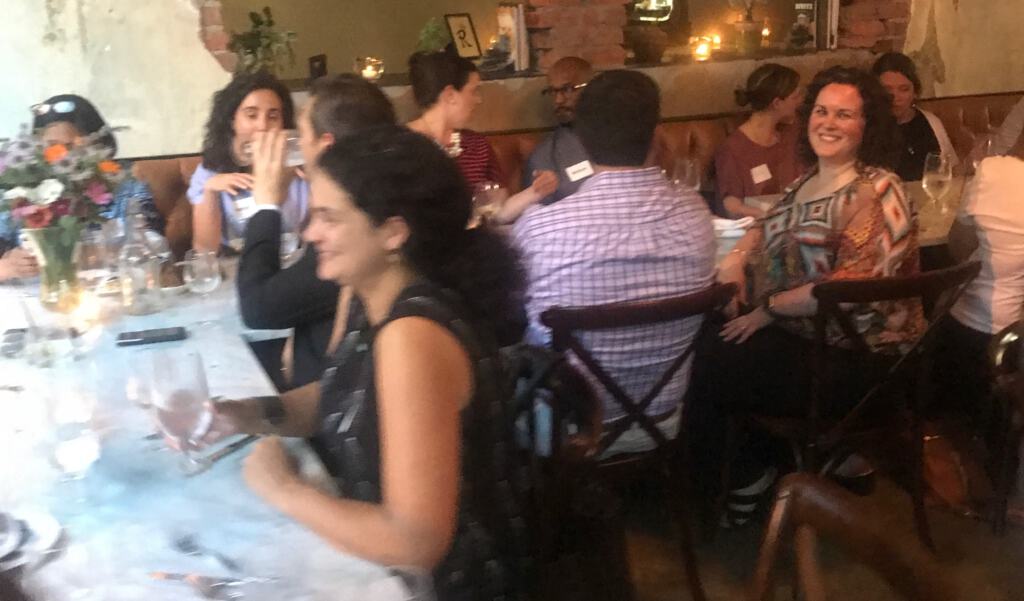
The feedback was tremendous.
“I’m still not sure how I landed seat at the table with people from such diverse backgrounds and interests, but I am humbled and thrilled to be a part of it.”
“The ticket to entry is bad ass-ery.”
“I did not know most of the folks in attendance. I’m glad to see you all are leveraging communication and relationships to bridge the divide.”
“This group can change the world.”
We are looking forward to reporting back to you next year about what comes from this group of change agents.
That’s why we do this work. When it comes to our students, our state, and our future, we believe two things are really important right now at this moment in time: the all in y’all and hope.
A few weeks ago we were in Edgecombe County and we ran into Elijah — a student who continues to inspire us and is featured in our video about the ongoing impact of Hurricane Matthew. We asked Elijah how he felt after losing his home to the flood waters. His response? He encouraged his family to go to the shelter to help those who were even less fortunate.
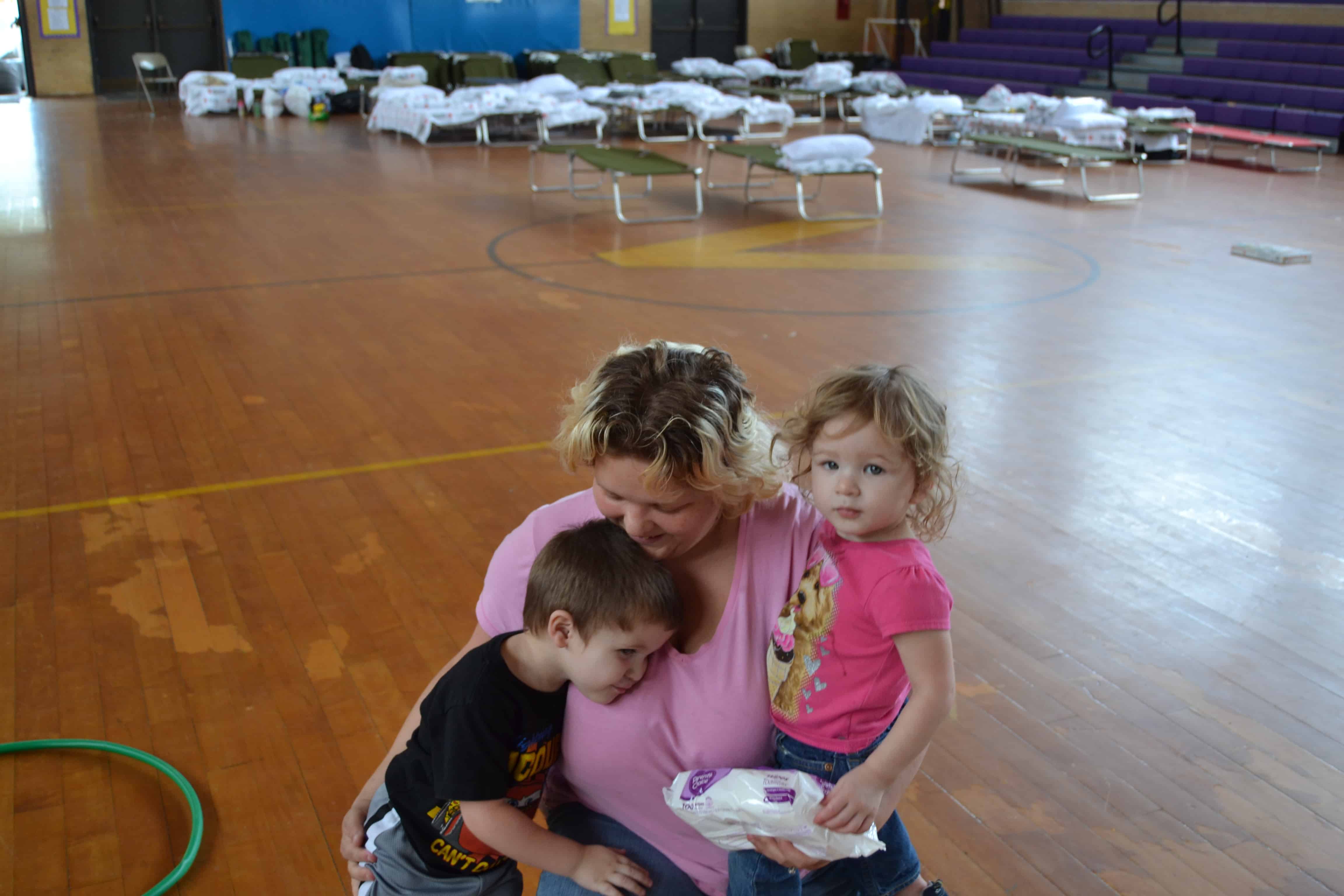
The selflessness and generosity of Elijah is not an anomaly. The hope we see in the eyes and actions of so many of our students who live with adverse childhood experiences speaks to their resilience.
Resilience can begin with our students and our schools, but it does not have to end there.
The story of our state is still being written, and it is up to all of us to write it. Together.
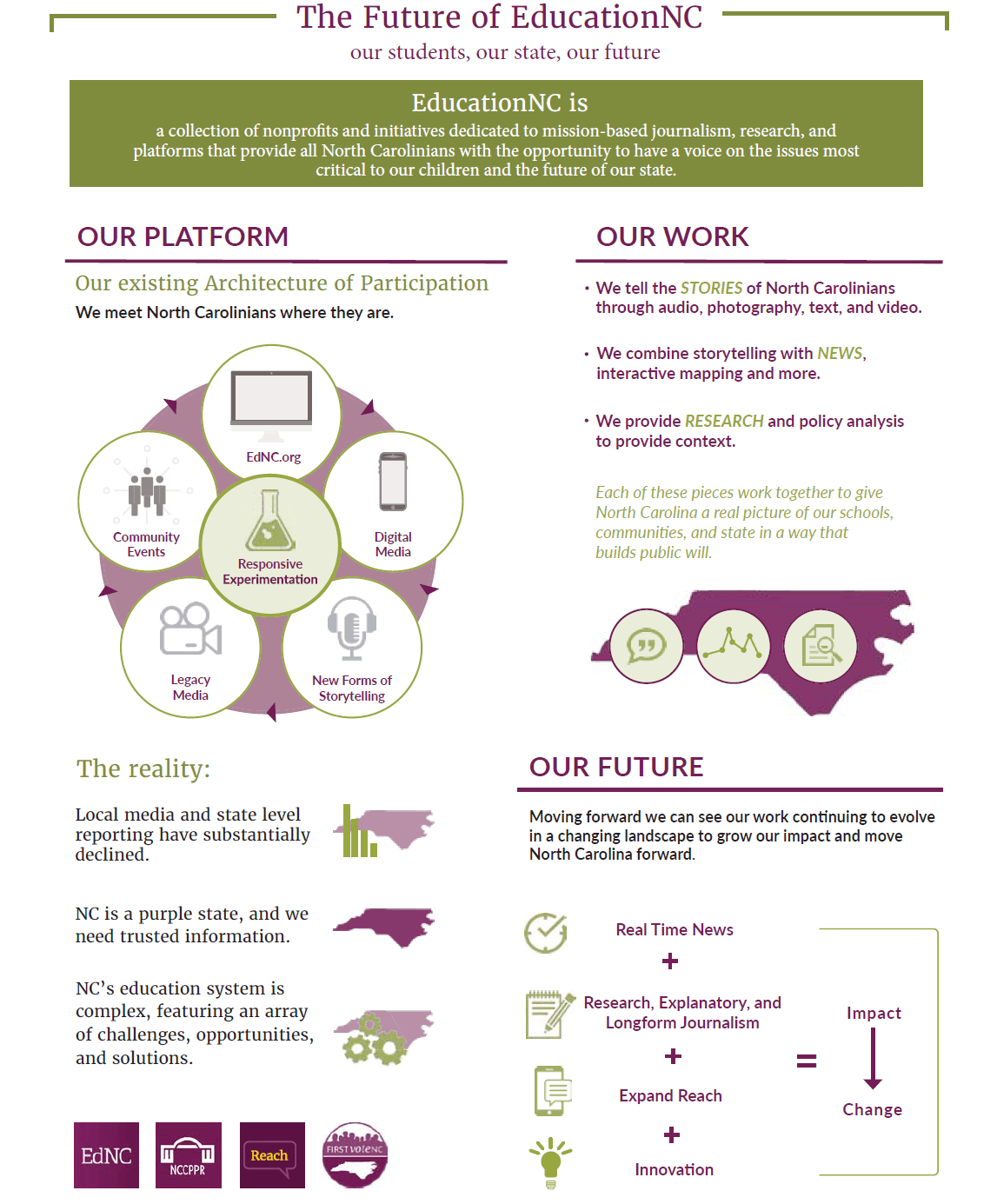

Our Mission
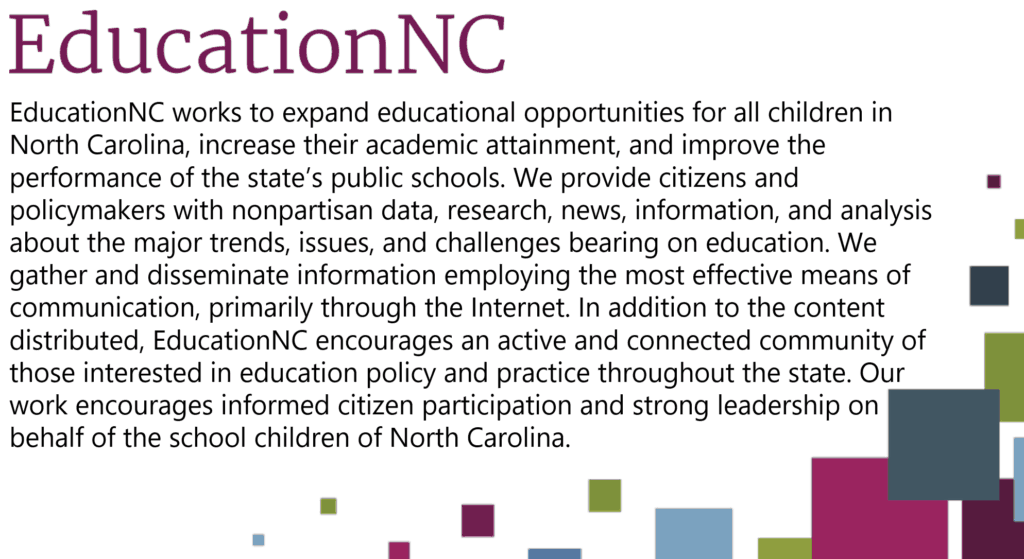
Our Team
We think of ourselves as servant leaders, and on our best days, we support each other without regard to titles.

Liz Bell is our reporter. From Hickory, she is Tar Heel born and bred, a wannabe poet, a purveyor of pop culture, and a self-described over-sharer. We think she is lovely. Ask her to recite a poem to you.

Alex Granados is our senior reporter. He is a storyteller, a juggler, Baltimore born, raised in Raleigh. He knows all of the very best drive-thrus. On good days, he sings the messages he leaves us on voicemail.
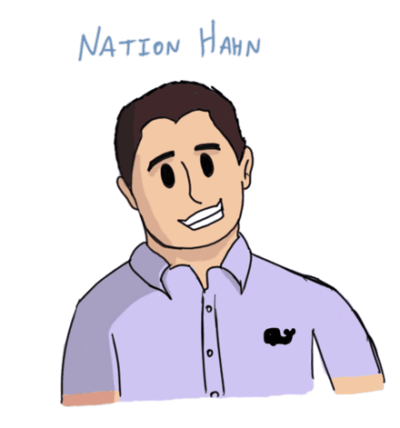
Nation Hahn is our chief growth officer and the project director for Reach NC Voices. From Lenoir, he is a reader, a food lover, a runner, and he spends entirely too much time on his device. There is nothing better than a long walk with him.
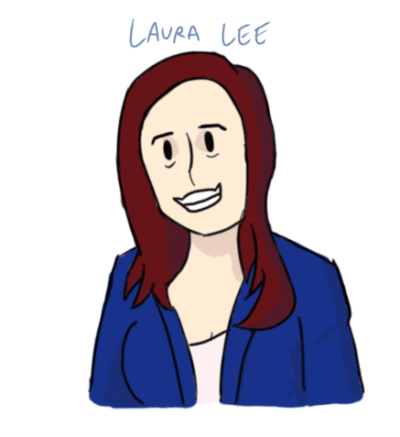
Laura Lee is our content director and managing editor. From Unionville, she is a cyclist, Tar Heel, media geek, and karaoke enthusiast. We call her boss lady, and more recently we call her our big-time, bossy boss lady. Tell her something really funny, and watch her laugh so hard she cries.

Nancy Rose is our chief operating officer. She is a techie, a number cruncher, a mom, a NC native, and a lifelong learner. She knows how to make syllabub, and if you score some of her toffee, it is the very best in the world.
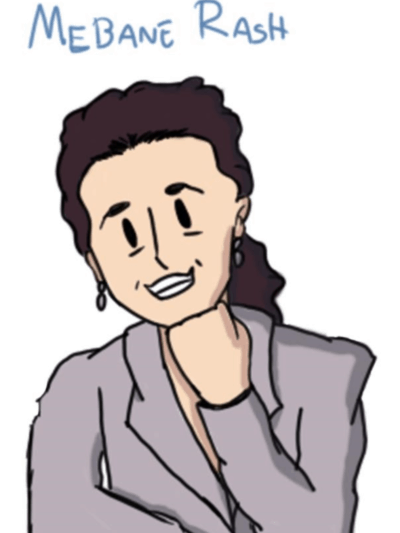
Mebane Rash is our CEO and editor-in-chief. She is an unaffiliated wonk, a mama, a traveler (India will be her 30th country), a farmer, and a proud Tar Heel. When she is home, you can find her in the evenings on her front porch talking about life, love, and our state.
And Molly Osborne is our new policy analyst, a recent graduate of the Harvard Kennedy School. She joined our team on July 1. She is a teacher, a reader, a puzzler, a sports enthusiast, and a lover of all Southern food.
Our thanks to Barb Baranski, Nate Barilich, Hunter Buxton, Katy Clune, Ferrel Guillory, Andrew Holton, Cat Oaker, Adam Rhew, and Tim Rosenberg who play invaluable roles on our team. Many thanks also to our attorneys, Maria Lynch and Amanda Martin, and our accountants, Batchelor, Tillery & Roberts, LLP.
And we could not do what we do without out the more than 400 of you statewide who lend your voice and your time to our architecture of participation. Thank you for being part of the EducationNC team.
Our 2017-18 Board of Directors
We are thankful everyday for our board and your dedication to our work, but more importantly your dedication to our students, our state, and our future. A special thanks to our executive committee. And a very special thanks to Gerry Hancock, our co-founder, chair, and publisher. Gerry pushes us everyday to do our best work, but at the end of every day, we know we have his unwaivering support. Leadership matters.
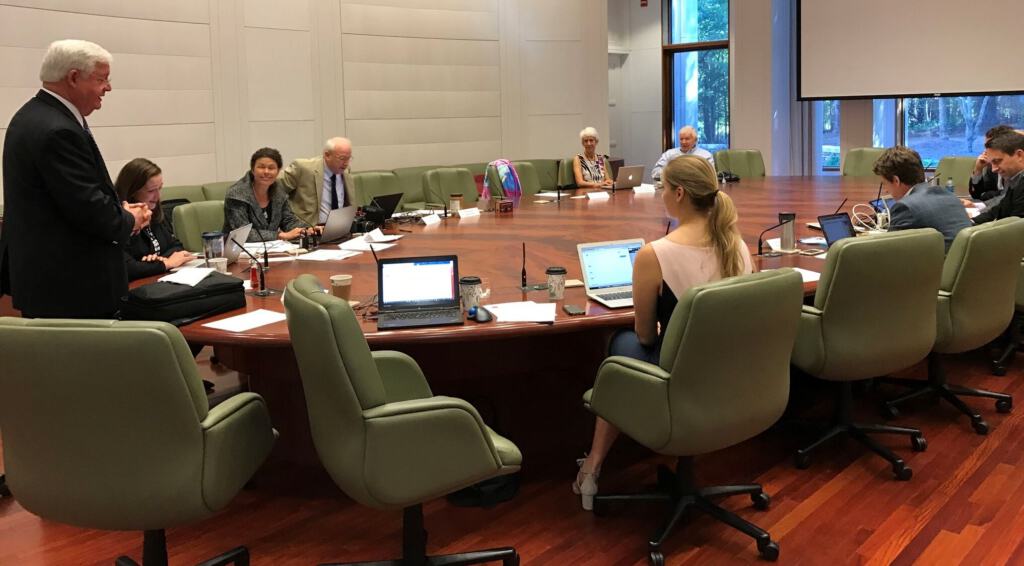
- Gerry Hancock, Chair and Publisher
- Ferrel Guillory, Vice Chair and Editorial Advisor
- Andrew Holton, Treasurer
- Debra Horton, Secretary
- Newell Clark, Executive Committee
- Ed Croom, Executive Committee
- Mebane Rash, CEO and Editor-in-Chief
- Chris William, Executive Committee
- Edna Earle Blue
- Tom Bradshaw
- JB Buxton
- Russ Campbell
- Donnell Cannon
- James Ford
- Mo Green
- Sam Houston
- Tom Lambeth
- Bob Orr
- Nancy Pekarek
- Shirley Prince
- Kayla Romero
- English Sall
- Bobbie Cavnar, Teacher of the Year
- Brad Wilson
- Larry Wooten

Our funders breathe life into our work. Many thanks to the following list of donors for funding EducationNC during the 2016-17 year:

- Z. Smith Reynolds Foundation
- The William R. Kenan, Jr. Charitable Trust
- Belk Foundation
- John William Pope Foundation
- Burroughs Wellcome Fund
- Duke Energy Foundation
- ChildTrust Foundation
- Park Foundation
- SAS Institute
- Goodnight Educational Foundation
- Wells Fargo
- O2 Energies
- North Carolina Farm Bureau Federation, Inc.
- The Winer Family Foundation
- Joseph Ableidinger
- Lauren Acree
- Karla Atkinson
- James Barrett
- Frances Bradburn
- Tom & Mary Mac Bradshaw
- Marisa Bryant
- Glenda & Bob Burgin
- Hunter & JB Buxton
- Russ Campbell
- Catherine Carter
- Larry Cartner
- Newell Clark
- Ran Coble and Jane Kendall
- Sandra Conway
- Howard Covington
- Ed Croom
- Alan Duncan
- Anne Eitelman
- Ted Fiske
- Lisa Fox
- Juan Granados
- Mo Green
- Kathleen & Ferrel Guillory
- Hope & Gerry Hancock
- William Harrison
- Joy Vermillion Heinsohn
- Deborah Jones
- Deborah Horton
- Marilyn Julian-Fox
- Tom Lambeth
- Andrew LaRowe
- Tricia Lester
- Amanda Martin
- Ellen McIntyre
- Kenneth McKee
- Day McLaughlin
- Fernando Melo
- Graig Meyer
- Chuck Neely
- Rolfe Neill
- Kristopher Nordstrom
- Katheryn Northington
- Bob Orr
- Travis Packer
- Cynthia Phillips
- Shirley Prince
- Mebane Rash
- Bob Ray
- Kayla Romero
- English Sall
- Pat Shane
- Marsha Sherry
- Sarah Shiflet
- Jeff Sossamon
- Amy Strecker
- Donna Strickland
- Linda Suggs
- Tony and Beth Swartz
- Kenneth Wells
- Chris William
- Freddie Williamson
- Steven Wrenn
- George Zeller
EducationNC provided professional services to Everett Gaskins Hancock LLP, First Vote NC, the North Carolina Network of Grantmakers, and the NC Community Development Initiative.
Thank you for your ongoing support of EducationNC. We could not do our work without you. Expect great things from us, and please consider making a sustaining contribution so we can continue to grow our impact in 2017 and beyond.
Previous annual reports and audited financial statements.
EducationNC | PO Box 1636 | Raleigh, NC 27602 | info@ednc.org
Recommended reading

